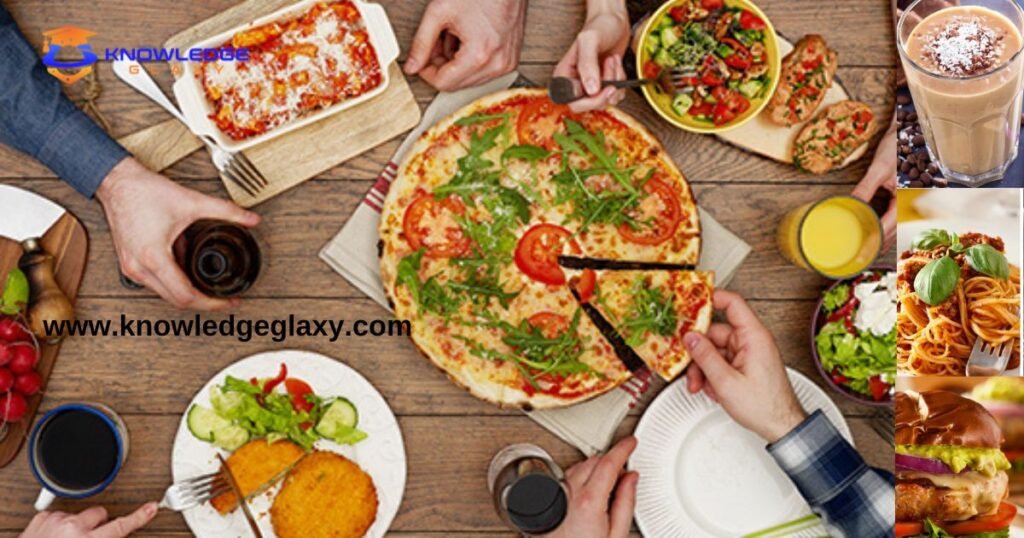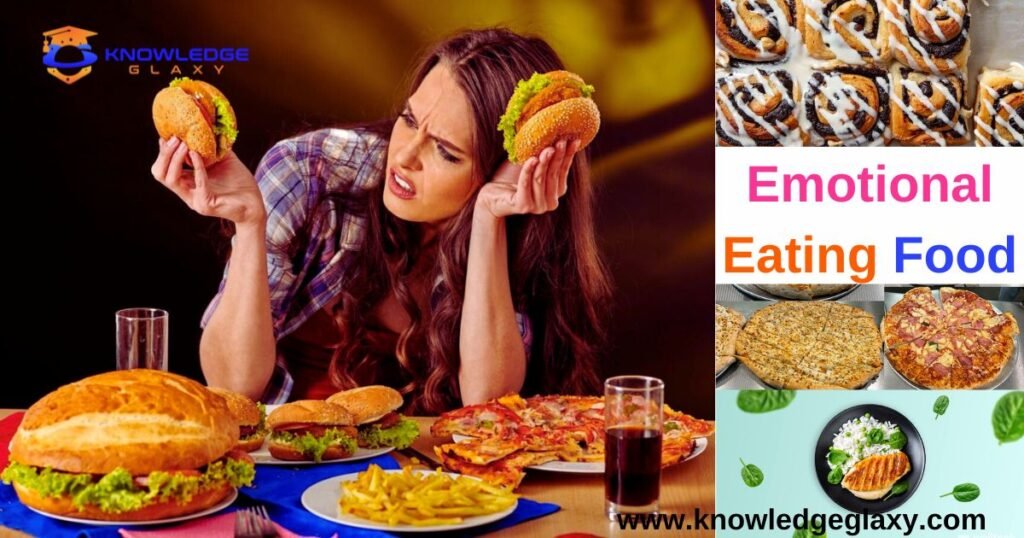We all get the urge to reach for emotional eating food like ice cream, pizza, or chips every once in a while when stressed or upset. But for many, emotional eating becomes a regular pattern that sabotages health goals and adds extra pounds that are tough to lose. Learning what drives emotional eating and techniques to stop this habit can get you back on track.
What is Emotional Eating?
Emotional eating means using food to make yourself feel better, suppress stress, or cope with unpleasant emotions instead of simply nourishing your body when physically hungry. It is estimated that 75% of overeating is triggered by emotions rather than hunger.
People eat to consciously or unconsciously cope with feelings like:
- Stress, anxiety
- Boredom
- Sadness, depression
- Anger, frustration
- Loneliness
- Fatigue
Food offers a quick yet temporary comfort or distraction from negative feelings. However, Emotional Eating Food ultimately makes you feel worse mentally and physically. It becomes an addictive habit that contributes to shame, weight gain, and health issues when unchecked.
Read More: Eating Disorders

Common Emotional Eating Triggers
Certain emotional states or situations reliably trigger the urge to dive into that pint of ice cream or bag of chips for many people prone to emotional eating. Recognizing your personal triggers is key to breaking this cycle.
Difficult Emotions
Emotions like stress, loneliness, anxiety, sadness, or boredom strongly influence emotional eaters to binge. Food numbs or avoids facing the emotion directly. This style of eating distracts from underlying feelings that seem too big to handle.
External Cues
Seeing, smelling or even thinking about tempting foods stirs cravings to eat even when not physically hungry. Driving by a favorite fast food joint or baking cookies at home intensifies urges to indulge.
Social Influences
Being around other people eating junk food or drinking makes it harder to stick to healthy habits due to peer pressure. Social gatherings like parties often promote overindulging.
Situational Cues
Certain activities, places, or times awaken the habit of reaching for food like watching TV, sitting at your desk, coming home at night, or on weekends. Routines subconsciously linked to snacking make it tougher to change behavior.
Health Risks of Emotional Eating
Using food to smother stress or sadness may feel comforting in the moment, but Emotional Eating Food poses serious health risks including:
Weight Gain
Emotion-triggered eating when you are not actually hungry often leads to taking in excess calories beyond your body’s needs. Over time, this calorie surplus packs on unwanted pounds that become increasingly hard to manage. Obesity significantly raises risks for other medical issues.
Heart Disease
Consistently overeating calorie-dense foods like sweets, fried items, or processed snacks increases inflammation in the body that damages blood vessels and strains the heart. Carrying excess body fat, especially around the abdomen, also taxes the cardiovascular system.
Diabetes
Weight gain and inflammation from a poor diet eventually cause insulin resistance setting the stage for type 2 diabetes. The additional body fat also makes managing healthy blood sugar levels much more difficult.
Certain Cancers
Being overweight and obese raises your likelihood of developing several types of cancer later in life including breast, colon, esophagus, kidney, pancreas, gall bladder, thyroid, ovary, cervix, and prostate cancers.
Depression & Anxiety
The guilt and shame triggered by bingeing create a vicious cycle where emotional eaters use food to relieve depression and anxiety caused by overeating. This pattern further damages any self-confidence, willpower, and emotional strength needed to break bad habits.

Recognizing all the ways Emotional Eating Food sabotages both physical and mental health is an important reality check motivating change.
How to Stop Emotional Eating
Breaking the emotional eating cycle requires retraining responses to stress and implementing healthier coping strategies. Here are some proven tips:
Identify Your Triggers
Boost self-awareness around your personal Emotional Eating Food triggers like certain emotional states, places, activities, or times of the day. Keeping a food journal tracking specifics around each incident helps detect patterns. Understanding exactly why and how you use food to cope gives power over the habit.
Express Feelings Elsewhere
Find healthier outlets for difficult emotions besides food like talking to a friend, journaling, exercising, listening to uplifting music, or engaging in a hobby. Let the emotion flow through activities besides eating. Building emotional strength regulates feelings before turning to food.
Mindful Eating
Practice mindful eating by slowing down mealtimes and eliminating other distractions to tune into physical hunger signals and satiety cues. Emotional hunger comes on suddenly with cravings for specific comfort foods while physical hunger builds more gradually and any food will suffice. Check-in periodically while eating about whether to continue or stop.
Self-Care Priority
Make regular self-care a top priority, not just a crisis response after overeating occurs. Enhance well-being through sufficient sleep, exercise, social connection, relaxing hobbies, and other tools to manage stress effectively long-term. Prevent Emotional Eating Food urges proactively with healthy daily lifestyle habits.
Limit Food Cues
Since external food temptations challenge willpower, try to reduce exposure. For example, avoid keeping trigger foods at home, drive a different route avoid fast food spots, put tempting treats out of sight in social settings, disconnect food from activities like watching television, etc. Making indulgences less convenient and visible trains new responses.
Social Support
Surround yourself with people who will support healthy eating habits and self-care while minimizing judgment or criticism. Making positive lifestyle changes sticks better when using a constructive cheer squad to motivate progress.
Therapy
Get professional support as needed to develop coping skills, manage difficult emotions, cultivate self-love, or resolve any underlying issues driving Emotional Eating Food like trauma, abuse, family dysfunction, etc. Individual or group therapy brings an objective perspective.
With consistent work countering Emotional Eating Food triggers, building emotional muscles, prioritizing self-care, and establishing healthy routines, food can move from foe back to a friend rather than a fumbling coping strategy.
Emotional Eating Disorder & Treatment
In severe cases, emotional eating progresses to a full-blown eating disorder requiring professional treatment. Diagnosing doctors look for regular binge eating patterns triggered by emotions, not hunger that cause:
- Significant weight gain or obesity
- Feeling out of control around food
- Abnormal eating behaviors like hiding food or eating alone
- Extreme shame, self-loathing, or depression after overeating sessions
- Withdrawal from social activities because of embarrassment
Several eating disorders can involve emotional eating components like binge eating disorder or bulimia nervosa.
Treatment plans to stop unhealthy Emotional Eating Food include:
Psychotherapy
Counseling builds coping strategies, self-esteem, and emotional intelligence to navigate triggers behind binges. Cognitive behavioral therapy in particular teaches patients how thoughts, feelings, and behavior interact. Becoming consciously aware of destructive thought patterns or false beliefs helps transform them. Group therapy provides community support for working through similar struggles.
Nutrition Education
Dietitians or nutritionists teach patients how to reconnect with genuine hunger and fullness signals. Meal planning, macronutrient balance, hydration needs, and food relationships are addressed. A non-restrictive approach moderates less healthy items while emphasizing more nutrient-dense choices.
Medical Care
Doctors assess for any medical issues driven or exacerbated by excess weight and poor diet like heart disease, hormone, or gut health imbalances. Medications might help regulate serotonin levels while stabilizing mood and impulse control. Bariatric weight loss surgery provides a tool for obesity with ongoing lifestyle support.
Lifestyle Redesign
Establishing healthy everyday habits like consistent nutritious meals, physical activity, stress relief practices, enough sleep, and social support provides structure. Emotional Eating Food Rhythms make well-being feel more natural and sustainable than short bursts of motivation. Accountability to treatment professionals or support groups prevents backsliding on progress.
With professional assistance in unlearning the tendency to use food to smother emotions, patients develop confidence relying on new coping tools and self-care abilities. Consistent lifestyle nourishment sustains emotional health long-term rather than quick fixes.
Emotional Eating Food: Understanding the Cycle and Breaking Free
Welcome to Knowledge Galaxy, your one-stop shop for all things health and well-being! Today, we delve into the realm of emotional eating, unpacking its nuances and empowering you to build a healthier relationship with food and emotions.
What is Emotional Eating?
Emotional eating isn’t simply grabbing a bite when stressed. It’s using food as a coping mechanism to numb, soothe, or celebrate emotions, regardless of physical hunger. We all do it occasionally, but when it becomes a frequent pattern, it can impact our well-being.
The Downward Spiral of Emotional Eating:
Imagine feeling stressed at work. Comfort beckons in the form of sugary sweets or greasy fast food. The initial bite brings a temporary escape, but soon, guilt, shame, and often, overeating, set in. Emotional Eating Food This cycle can take a toll on our physical and mental health, contributing to weight gain, low self-esteem, and even chronic health conditions.
Identifying Your Triggers:
The first step to breaking free is self-awareness. What are your emotional eating triggers? Common culprits include stress, sadness, boredom, anger, loneliness, and even positive emotions like celebrating or rewarding yourself.

Journaling can be a powerful tool. Track your emotions, food choices, and situations where you tend to reach for comfort food. Emotional Eating Food Recognizing patterns is key to developing healthier coping mechanisms.
Beyond Food: Healthy Coping Strategies:
It’s time to expand your emotional toolbox! Instead of food, try:
- Mindfulness and relaxation techniques: Meditation, deep breathing, and yoga can help manage stress and emotional fluctuations.
- Physical activity: Exercise releases endorphins, and natural mood boosters. Find an activity you enjoy, whether it’s dancing, swimming, or a brisk walk.
- Creative expression: Journaling, painting, playing music, or engaging in other creative pursuits can provide a healthy outlet for emotions.
- Social connection: Surround yourself with supportive loved ones or consider joining a support group for emotional eating.
Developing a Balanced Relationship with Food:
Food is fuel, not just comfort. Here’s how to cultivate a healthier relationship:
- Mindful eating: Savor your food, pay attention to flavors and textures, and eat slowly. Avoid distractions like screens while eating.
- Intuitive eating: Listen to your body’s hunger and fullness cues. Eat when you’re truly hungry and stop when you’re comfortably satisfied.
- Balanced meals and healthy snacks: Prioritize fruits, vegetables, whole grains, and lean proteins. Don’t deprive yourself, but make informed choices.
Seeking Professional Help:
If emotional eating feels overwhelming or significantly impacts your life, seeking professional help can be transformative. Therapists can provide tools for managing emotions, while registered dietitians can guide you toward healthier eating habits.
Together, We Can Find Balance:
Knowledge Galaxy supports you on your journey to well-being. Remember, breaking free from emotional eating food is a process, not a destination. Emotional Eating Food Be patient, celebrate small victories, and don’t hesitate to seek help. You deserve to nourish your body and emotions with compassion and understanding.
Overcoming Emotional Eating Challenges
Breaking free of emotional eating proves difficult with society’s abundance of hyper-palatable, convenient comfort foods. Stress levels stretch coping abilities for many as well. How can you meet common obstacles on the path to change?
Coping with Stress
High stress depletes the mental bandwidth and willpower needed to override emotional eating food habits. The key is recognizing stress as a trigger and having go-to healthier stress busters in place before urges hit. Emotional Eating Food Go for a walk, phone a friend, take a relaxing bath, or listen to uplifting music instead of raiding the fridge.
Building long-term resilience through self-care, healthy boundaries, supportive relationships, and lifestyle balance also moderates stress’s impact in the first place. Don’t try to just power through anxiety without support.
Overcoming Cravings
Cravings for favorite comfort foods or beverages spike around emotional eating triggers. Having replacement distractions handy helps in the moment an urge strikes. Fruit, herbal tea, flavored seltzer, gum, or hard candy can hit the spot. Emotional Eating Food Also accepting the craving without reacting often makes it crest then fade within a few minutes.
Planning treats into your diet in moderation also prevents feeling deprived. Have that cookie after a nutritious lunch or chocolate with your afternoon latte. Just watch portions.
Social Pressures
Other people’s food choices and comments understandably influence your own decisions and self-talk. But take control by planning what you’ll eat and drink at parties ahead so you stick to your intentions. Politely pass on pushy offers. Find like-minded people watching calories too. Stand up for your health goals rather than letting others sabotage progress.
Slip-Ups
Perfectionism sets you up to abandon healthy emotional eating food habits after inevitable slip-ups or bad days. Allow grace knowing progress happens slowly with obstacles along the way. Forgive small setbacks or overindulgences at events, then promptly get back on track with the next meal or day. Support groups sharing stories and backup plans keep you accountable after missteps.

Read More: Emotional Eating Food
FAQs
What causes emotional eating?
Emotional eating food is often caused by using food to deal with difficult feelings like stress, sadness, anxiety, boredom, anger, shame, or loneliness. The habit develops because eating offers a quick distraction from emotional discomfort.
What foods are associated with emotional eating?
Classic emotional eating foods include ice cream, chocolate, pizza, french fries, potato chips, cookies, cake, and fast food. These foods are highly palatable and provide a temporary comforting feeling when consumed.
Is emotional eating an eating disorder?
Emotional Eating Food can progress into a full-blown eating disorder like binge eating disorder when it becomes frequent and severely impacts health and functioning. Not all emotional eating meets the diagnostic criteria for an eating disorder though.
How can you stop emotional eating?
Strategies to stop Emotional Eating Food include identifying personal triggers, expressing feelings through activities besides eating, practicing mindful eating habits, reducing exposure to tempting foods, getting social support, and prioritizing self-care. Seeking counseling provides professional guidance tailored to your unique needs.
What causes food addiction?
The highly processed, hyper-palatable foods prevalent today are intentionally engineered to be addictive. Salt, sugar, and fat act on the same pleasure centers in the brain as drugs. This fuels overeating that parallels substance addiction for some. Underlying emotional issues can also drive addictive-like eating patterns.
Can you ever cure emotional eating?
With diligent work healing the psychological and lifestyle factors underlying Emotional Eating Food, many people fully overcome unhealthy relationships with food long term. Implementing alternate coping strategies, building self-love, and establishing balanced everyday wellness habits facilitates true change. It takes commitment, self-compassion, and patience.






